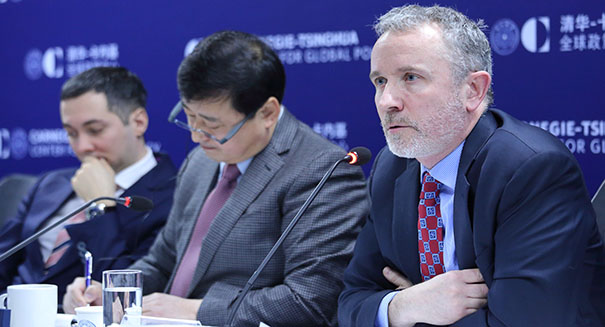Registration
You will receive an email confirming your registration.
China and Russia have established closer ties under the leadership of Xi Jinping and Vladimir Putin, forging large-scale energy and economic ties, conducting joint naval exercises, and signing treaties to reaffirm their strategic partnership. While world leaders hoped the United States and Russia would focus on areas in which to cooperate in the post-Cold War era, more emphasis has been placed on competition. Rhetoric from U.S. President Donald Trump’s administration, though, has renewed discussions about a possible improvement of U.S.-Russia relations that has the potential to shift the great power dynamics.
This panel focused on the future of China-Russia relations and opportunities for collaboration, such as their mutual opposition to the THAAD missile deployment in South Korea and Russia’s status as China’s top crude oil supplier. Panelists gave their insights into U.S. views of the China-Russia relationship, the evolving U.S.-China-Russia relations under President Trump, and China’s reactions to potential changes and challenges.
This panel was the second in the 2016-2017 Carnegie Global Dialogue Series. The discussion was off the record.
Discussion Highlights
- A Solid Foundation of Sino-Russian Relations: Several panelists agreed that, despite historical tensions, relations between China and Russia are now firmly rooted in shared interests and are likely to remain strong in the future. One panelist described an internal assessment by the Kremlin that concluded that tension with China was increasingly unlikely. This finding, the discussant continued, combined with deepening economic ties and a shared conception of global governance that differs from the Western-led order, lead to a Russia-China relationship that is likely to remain strong regardless of any change in relations with the Untied States.
- Synergy in Central Asia: With new investment programs like the Belt and Road Initiative increasing Chinese influence in Central Asia, Russia’s traditional backyard, many of the discussants expressed concern over the potential for conflict between China and Russia. However, other panelists argued that rather than acting as a source of conflict, Central Asia may be a new area of strategic synergy for China and Russia. Chinese investment and infrastructure could bring prosperity to the region that may also benefit the Russian economy. One panelist said that there could be a division of interests in the region, with China taking a dominant economic role and Russia a dominant security role.
- Regional and International Stability: Several panelists expressed the view that, far from being concerned about any improvement in U.S.-Russia relations, China would welcome an increase in ties that could contribute to international stability. China, they argued, recognizes that the U.S.-Russia relationship has a unique role in world affairs, and any increase in rivalry would have large ramifications on world stability. A stronger U.S.-Russia relationship is in line with China’s overall strategy of win-win cooperation and forging a new model of great power relations, noted one panelist.
- Russian Sanctions: The sanctions imposed on Russia after its actions in Ukraine may not be entirely bad, a panelist said. While undoubtedly impacting the Russian economy, the discussant argued that oil is having a much larger effect, and the sanctions serve a useful political purpose in justifying the actions and foreign policy of the Russian government. The panelist also noted that experts in the Kremlin are pragmatic about this topic and do not expect a sweeping repeal of sanctions, which the panelist said runs contrary to the common narrative that Russia is desperate to have the sanctions lifted.
- Skepticism Over Renewed U.S.-Russia Ties: While previous post-Cold War administrations have tried to improve relations with Russia, none have succeeded, panelists pointed out. They said that fundamental differences in values, national interests, and world outlook make any sort of U.S. cooperation with Russia difficult. Many noted that some in the Trump administration hope for a “grand bargain” with Russia to fight terrorism, but even apart from the aforementioned fundamental differences, a lack of trust, cooperation, or interoperability between the Russian and American military and intelligence communities make this very unlikely. Despite the rhetoric, several experts expressed doubt of any real cooperation between the United States and Russia under the new administration.
Andrew S. Weiss
Andrew S. Weiss is vice president for studies at the Carnegie Endowment for International Peace, where he oversees research in Washington and Moscow on Russia and Eurasia.
Chen Yurong
Chen Yurong is a senior research fellow and director of the Department for European-Central Asian Studies at the China Institute of International Studies. Her research focuses on Sino-Russian relations and economic and political relations between Central Asia and the Commonwealth of Independent States.
Alexander Gabuev
Alexander Gabuev is a senior associate and the chair of the Russia in the Asia-Pacific Program at the Carnegie Moscow Center. His research is focused on Russia’s policy toward East and Southeast Asia, political and ideological trends in China, and China’s relations with its neighbors.
Guan Guihai
Guan Guihai is an associate professor and an executive vice president of the Institute of International and Strategic Study at Peking University. His research focuses on Russian diplomacy and Sino-Russian relations.
Paul Stronski
Paul Stronski is a senior fellow in Carnegie’s Russia and Eurasia Program, where his research focuses on the relationship between Russia and neighboring countries in Central Asia and the South Caucasus.
Paul Haenle
Paul Haenle is the director of the Carnegie–Tsinghua Center for Global Policy based at Tsinghua University in Beijing. Haenle’s research focuses on Chinese foreign policy and U.S.-China relations.
